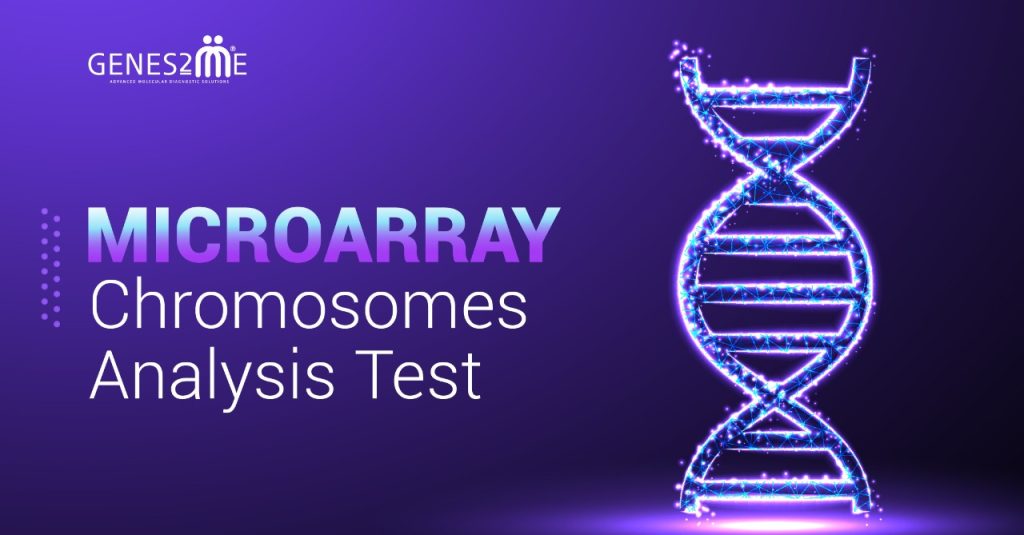Important Facts to know about Chromosomal Microarray Test

Chromosomal microarray analysis is a powerful diagnostic instrument when used correctly. CNV testing by microarray may differ from lab to lab, but with the right detection services offered, you can get an accurate result.
In this article, we are telling you how you should decide when you need a cytogenetic microarray test, how the chromosomal microarray test works, what it detects, and when it has proven useful. In addition, with recent advancements in technology, the chromosomal microarray test cost in India has become reasonable compared to the prices offered in the West.
Here are the key facts you should know before opting for the test.
What does the chromosomal microarray test detect?
Chromosomal microarray (CMA) testing analyses extra (duplicated) or missing (deleted) chromosomal segments. These segments are also known as copy number variants (CNVs). These include:
- Micro-duplications or micro-deletions of chromosomal segments are minuscule to see under a microscope, but they contain various multiple genes.
- Abnormalities in a chromosome number (Down, trisomy, monosomy, etc.).
- Major unbalanced rearrangements of chromosome structure.
Based on the platform, cytogenetic microarray testing can also detect:
- Excessive homozygosity; which looks for recessive disease or imprinting disorders
- Triploidy and various other duplications of the entire chromosome set
- CMA testing can also detect mosaicism (a mixture of normal and abnormal cells) up to 20-25 per cent.
So, what does cytogenetic microarray analysis does not detect?
Any test cannot find all the genetic diseases. Some type of variants requires other genetic tests because some regions are technically difficult to isolate and analyze.
Cytogenetic microarray testing does not detect:
- Micro changes in the sequence of single genes also known as point mutations
- Micro-deletion testing by CMA can be done by it cannot find tiny duplications and deletions of DNA segments.
- Balanced chromosomal rearrangements, also known as balanced translocations and inversions.
- There is a technology limitation in CMA testing. Most cytogenetic microarray testing cannot detect mosaicism below 20-25%. Other services also cannot detect homozygosity or triploid.

How does microarray testing work?
“Microarray” utilizes a microchip-based testing platform that helps in high-volume, automated analysis of many pieces of DNA at once. Chromosome regions that bond together, CMA chips use labels to analyze these regions. Cytogenetic microarray analysis uses computer analysis to compare a patient’s genetic material to that of a reference sample. If there’s a difference between a patients’s DNA and the reference sample, then it is called a variant.
Who Benefits from chromosomal microarray test?
Microarray testing in pregnancy is used to detect chromosomal abnormality in the unborn child. It is also useful for individuals who do not fit in a specifically known syndrome such as Down syndrome, but showcase some of the following symptoms:
- Developmental delay or intellectual impairment
- Autism spectrum disorders (ASD)
- Multiple congenital anomalies, such as dysmorphic facial features.
The cost of chromosomal microarray analysis becomes cost-effective tests when your differential reveals more than one medical condition analyzed by the technology. Some patients can even contain more than one genetic condition, and this test can be considered if the patient does not show characteristics typically related to an established diagnosis. A genetic specialist can tell you whether you require the test or not.
How Can You Use the Results?
Many families and parents of children with previously undiagnosed conditions can use CMA testing. Any variant found on CMA can not only provide a long-awaited explanation for the patient medical condition but can also be useful in managing these conditions:
- Specific developmental and cognitive functions are associated with some variants that guide prognosis, educational, management interventions.
- Analysis or indications for any syndromes that may have been missed due to complications
- Decisions on reproductive planning and screening for at-risk family members.
The microarray test pregnancy cost is reasonable compared to the benefits it offers you in terms of psychosocial and preparing you for a new life ahead.
